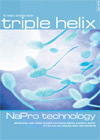Legal challenge on Christ's existence
An Italian court has decided, after a long drawn out legal battle, that Catholic priest Enrico Righi will not have to prove in court Christ's historical existence. The priest was taken to court in September 2002 after he criticised Luido Cascioli's atheist book The Fable of Christ in a local Catholic paper. (Brussels Journal 2006; February)
US Supreme Court to review 'partial birth abortion' law
The US Supreme Court has agreed to hear the government's appeal of lower court rulings that prevented enforcement of a federal law banning 'partial birth abortion'. The court will hear arguments on the appeal in October. Abortion became legal in the US with the Supreme Court's Roe v Wade decision in 1973. Congress passed the law banning partial birth abortion in November 2003, and it was signed by President George Bush (BMJ 2003;327:1009). It has never come into effect because three lower federal courts ruled the law unconstitutional and unenforceable because it does not include an exception to protect the health of the woman. Meanwhile the state of South Dakota has voted to ban all abortion other than to save the life of the mother. (BBC News 2006; 7 March)
Hewitt opposes abortion changes
Health Secretary Patricia Hewitt has said she is not in favour of introducing tougher UK abortion laws. She said she was against reducing the 24-week limit, but wanted to try to cut the number of late terminations. Her comments came after a survey in the Observer suggested that 47% of UK women wanted tougher abortion laws. Pro-life campaigners welcomed the results of the survey of 1,790 adults, but pro-abortion groups say women need access to late abortions. (BBC News 2006; 29 January)
Medics keep the faith
Some 61 per cent of GPs and more than half of consultants believe in God, a survey for Doctor (10 January) has revealed. But it seems the message is not getting through to NHS Trust managers. The Times notes that Nursing Standard reports the laying-off or shortened hours of hospital chaplains in NHS cost-cutting measures. Carol English, a professional officer for the Amicus union, says trusts see chaplains as a 'soft touch'. (The Times 2006; 17 January)
Euthanasia 'extremely rare in UK'
Euthanasia is extremely rare in the UK and few doctors want to see it legalised, a study says. Pro-euthanasia campaigners have long argued terminally-ill patients are helped to die in secret. But fewer than 1% of deaths were by euthanasia in 2004 and few doctors want to see the law change, the Brunel University survey of 857 doctors found. (BBC News 2006; 17 January)
Racial and Religious Hatred Bill
The Government's defeat (by one vote!) over key amendments to the Racial and Religious Hatred Bill ensures that the offence of inciting religious hatred has to be intentional and specifies that proselytising, discussion, criticism, insult, abuse and ridicule of religious belief or religious practice will not be an offence. Without Christians' protests and God's provision the vote would have been lost. (Evangelical Alliance 2006; February)
Britons choose assisted suicide
Retired Bath doctor Anne Turner, 66, is the latest in a line of Britons choosing to end their life with the assistance of the Dignitas clinic in Switzerland. The controversial charity says it has now helped more than 40 people from the UK to commit suicide. The first, in January 2003, was Reginald Crew. (BBC News 2006; 24 January)Calling a spade a spade
The Daily Telegraph has given a frosty welcome to the Voluntary Euthanasia Society (VES) rebranding itself as 'Dignity in Dying'. In a short editorial titled 'Euthanasia's euphemism' it states, 'It tells you something when an organisation has to refer to itself by a euphemism. Who among us does not want to die with dignity? Every hospital, hospice and care home does its best to ease our transit to that undiscovered country from whose bourn no traveller returns. Many campaigning groups play these silly verbal games, of course: Friends of the Earth, Women Against Rape, Liberty. There is even a unilateralist group called the Movement for the Preservation of Life on Earth (which the rest of us, by implication, are against). In this case, though, it is hard to shake off the suspicion that euthanasiasts are shy of spelling out what they are really about, viz killing people.' (Daily Telegraph 2006; 23 January)
Making babies
'The choices for couples having children – or for those who are concerned about the possible genetic consequences if they do – have increased dramatically in recent years – but these advances need to be carefully monitored. The possibility of deliberately creating 'designer babies' – children genetically engineered for their good looks, intelligence or sporting abilities are not on the horizon – and may never be because of the complex nature of our genetic make-up.' These are two of the conclusions of the Human Genetics Commission's report 'Making Babies: reproductive decisions and genetic technologies' published on 31 January following a national consultation exercise. (BBC News 2006; 31 January; HGC, www.hgc.gov.uk)
New powers over death considered
Government ministers are considering plans to let adults appoint someone who could block life-sustaining treatment if they were too ill to do so themselves. The Mental Capacity Act, which comes into force in Spring 2007, gives people the chance to appoint someone who can instruct a doctor on their behalf. Under plans to implement the Act, they would need to indicate if this included powers to refuse life-sustaining care. But critics have said the proposals amount to 'back-door euthanasia'. (BBC News 2006; 30 January; DCA, www.dca.gov.uk)































